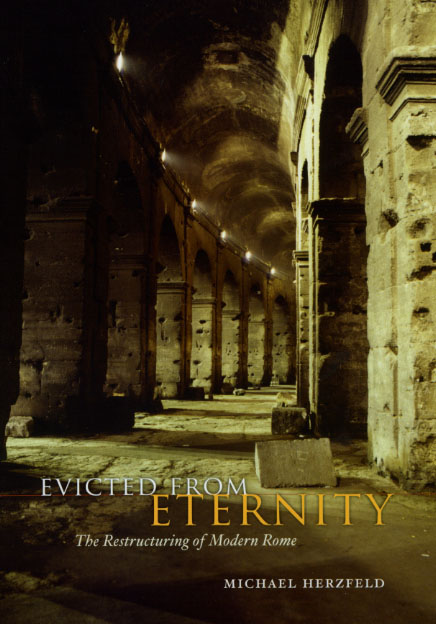A trailer for
Monti Moments
a film companion to Evicted from Eternity: The Restructuring of Modern Rome by Michael Herzfeld
Michael Herzfeld on the book and the film:
Writing Evicted from Eternity has given me a deep appreciation of what video can do for the writing process, much as the making of Monti Moments—my first film—has alerted me to the limitations and possibilities of writing. Indeed, these are not mutually exclusive projects. But producers and audience alike focus (a revealing term!) differently in each genre of representation, and teaching the film and book together, as I have just done for an undergraduate class on “Cultures of Southern Europe,” should help students develop new ways of evaluating ethnographic evidence and of comparing the different emphases that these two modalities make possible.
Some things clearly could not be included in a film. The scene in a condominium meeting, for example, is a key moment in the book because it shows two generations of Romans, the older residents pitting their priority of managing social relations with civility and a wink at convenient infractions against their juniorsÝ insistence on a more formal respect for legality. At stake was the question of whether the condominium administrator (who was presiding) should be fired for his failure to follow the letter of the law. In the book I could use pseudonyms for the actors in this deeply personal and potentially embarrassing moment, which provides anthropologically crucial insights into Roman social practices and attitudes; that protection is not available in a film. But telling details of their interaction—gesture, rhythm, and tone—could be described all the more vividly because I was able to pore over the videos I had made, imbuing my text with a sense of physical presence. On the other hand, while Evicted is an intensely personal narrative (since I became deeply involved in working with some of the victims of the massive evictions marring the Eternal City), I did not want to dwell excessively on my own role as such. I do describe my emotions and commitments; but the reader/viewer will perhaps learn equally revealing but differently framed aspects of my engagement from the film, in which my neighborsÝ gentle ironies about “the professor” and his interest in past scandals and present problems give a resonance to reflexivity that no amount of verbal self-examination can provide.
Those who view the film and read the book, then, may want to discuss the relative merits and disadvantages of each medium. Still more significant, however, is what each modality brings to the other, and how deeply they become intertwined when the filmmaker and the author are one and the same person, operating solo in each medium. Above all, I hope that the twinning of the two media will convey with enhanced intensity what it means to live amid the architecturally, politically, and socially baroque sensuality of Rome today.
Monti Moments at EnMasse Films.
Order the film Monti Moments at Berkeley Media
©2009 by Michael Herzfeld. All rights reserved. This text may be used and shared in accordance with the fair-use provisions of U.S. copyright law, and it may be archived and redistributed in electronic form, provided that this entire notice, including copyright information, is carried and provided that the University of Chicago Press is notified and no fee is charged for access. Archiving, redistribution, or republication of this text on other terms, in any medium, requires the consent of the University of Chicago Press.
See also:
Our catalog of anthropology titles Other excerpts and online essays from University of Chicago Press titles Sign up for e-mail notification of new books in this and other subjects Read the Chicago Blog
